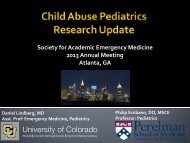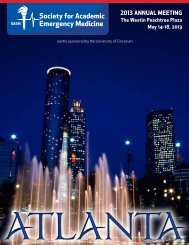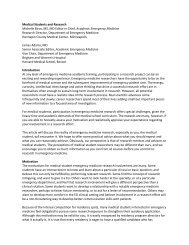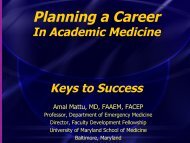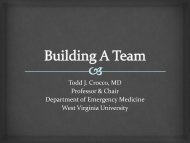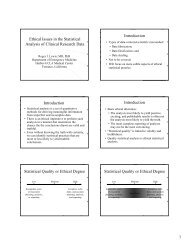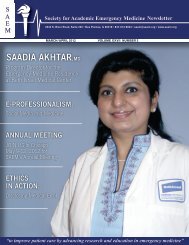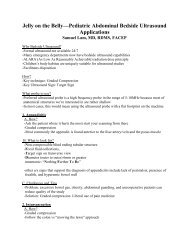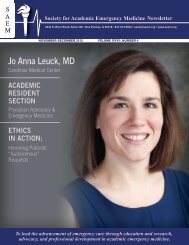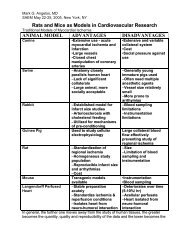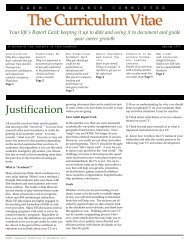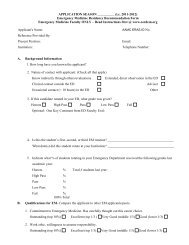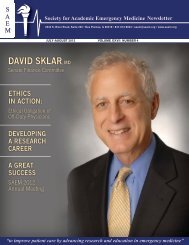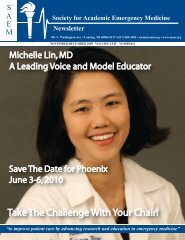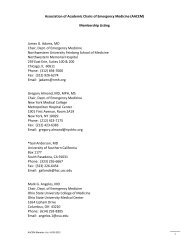Nov-Dec 2011 Newsletter.pdf - The Society for Academic ...
Nov-Dec 2011 Newsletter.pdf - The Society for Academic ...
Nov-Dec 2011 Newsletter.pdf - The Society for Academic ...
Create successful ePaper yourself
Turn your PDF publications into a flip-book with our unique Google optimized e-Paper software.
Nathan Kuppermann receives Award <strong>for</strong><br />
Outstanding Contribution in Research<br />
<strong>The</strong> American College of Emergency Physicians (ACEP)<br />
has recognized Nathan Kuppermann, Professor of Emergency<br />
Medicine and Pediatrics and chair of the UC Davis Department<br />
of Emergency Medicine, with its <strong>2011</strong> Outstanding Contribution<br />
in Research Award, the only research-related honor awarded by<br />
ACEP this year.<br />
Kuppermann received the award in October <strong>2011</strong> in San<br />
Francisco at the organization’s Scientific Assembly, the largest<br />
annual gathering of emergency physicians in the country. He was<br />
among a select group of physicians recognized by ACEP <strong>for</strong><br />
excellence across a wide range of activities, including leadership,<br />
policy, education and research.<br />
Kuppermann’s work at UC Davis and as founding chair and a<br />
principal investigator of the Pediatric Emergency Care Applied<br />
Research Network (PECARN) has earned him an international<br />
reputation <strong>for</strong> excellence in academic emergency medicine.<br />
Through PECARN and other collaborations, he established a<br />
network of pediatric emergency departments nationwide that work<br />
together to per<strong>for</strong>m high-impact research to improve the care of<br />
acutely ill and injured children. Together, PECARN members and<br />
other pediatric emergency medicine collaborators have enrolled<br />
many thousands of participants in studies that have resulted in<br />
new and definitive evidence and recommendations <strong>for</strong> various<br />
pediatric emergency conditions, including the development of<br />
indications <strong>for</strong> pediatric head trauma imaging, the evaluation of<br />
fever and meningitis in young children, and assessing the risks <strong>for</strong><br />
cerebral edema in children with diabetic ketoacidosis.<br />
Earlier this year, he helped to further advance the field of<br />
pediatric emergency medicine in Argentina, and is now helping<br />
develop the first pediatric emergency medicine research network<br />
between that country and Uruguay. In addition, Kuppermann is<br />
leading a new, $3.3 million grant from the National Institutes<br />
of Health (NIH) that provides a training program <strong>for</strong> the next<br />
generation of emergency medicine researchers who will explore<br />
the care of adults and children with acute traumatic injuries and<br />
emergent medical illnesses.<br />
Kuppermann was elected to the Institute of Medicine in 2010<br />
and is the recipient of numerous research awards, including<br />
the Pediatric Emergency Medicine and Critical Care Research<br />
Award from the American Academy of Pediatrics Section on<br />
Emergency Medicine. He is the primary or senior author of nearly<br />
100 research papers published in leading journals, including<br />
the New England Journal of Medicine, Journal of the American<br />
Medical Association, <strong>The</strong> Lancet, Annals of Emergency Medicine<br />
and Pediatrics.<br />
Kuppermann holds the Bo Tomas Brofeldt Endowed Chair in<br />
the UC Davis Department of Emergency Medicine. He received<br />
his medical degree from UC San Francisco, completed his<br />
residency at Harbor-UCLA Medical Center in Torrance, Calif.,<br />
and a fellowship in pediatric emergency medicine at Children’s<br />
Hospital Boston. He also holds a master’s degree in public health<br />
from the Harvard School of Public Health.<br />
UC Davis Health System is advancing the health of patients<br />
everywhere by providing excellent patient care, conducting<br />
groundbreaking research, fostering innovative, interprofessional<br />
education, and creating dynamic, productive partnerships with<br />
the community. <strong>The</strong> academic health system includes one of the<br />
country’s best medical schools, a 645-bed acute-care teaching<br />
hospital, an 800-member physician’s practice group and the new<br />
Betty Irene Moore School of Nursing. It is home to a National<br />
Cancer Institute-designated cancer center, an international<br />
neurodevelopmental institute, a stem cell institute and a<br />
comprehensive children’s hospital. Other nationally prominent<br />
centers focus on advancing telemedicine, improving vascular<br />
care, eliminating health disparities and translating research<br />
findings into new treatments <strong>for</strong> patients. Together, they make UC<br />
Davis a hub of innovation that is trans<strong>for</strong>ming health <strong>for</strong> all. For<br />
more in<strong>for</strong>mation, visit healthsystem.ucdavis.edu. ◗<br />
Peer-reviewed Lectures (PeRLs) Are Coming!<br />
<strong>Academic</strong> Emergency Medicine will be publishing a series of videos of lectures on topics in emergency medicine. <strong>The</strong>se are<br />
intended to represent the state of the art in emergency medicine education. Residents, practicing physicians, and medical<br />
students may use them <strong>for</strong> didactic education. <strong>The</strong> videos should contain both the presented audiovisual materials <strong>for</strong> the<br />
lectures (such as PowerPoint slides) and live video of the presenter.<br />
Each video lecture should contain the following in<strong>for</strong>mation:<br />
• A written abstract describing the content of the lecture • Lecture title, author, and institutional affiliation on a title slide<br />
• Conflict of interest statement<br />
• A brief overview of the lecture content (~ 1 minute)<br />
• <strong>The</strong> body of the lecture (< 30 minutes)<br />
• References and further reading (~ 30 seconds)<br />
• Contact in<strong>for</strong>mation <strong>for</strong> questions<br />
Prospective authors should consider contacting the PeRLs editorial board (through John Burton, MD, Senior Associate Editor:<br />
jhburton@carilionclinic.org) <strong>for</strong> a discussion be<strong>for</strong>e starting on video production of a lecture <strong>for</strong> a determination of topic<br />
suitability. Videos can be complex to produce, and given the ef<strong>for</strong>t involved, having a discussion with an editor either by e-mail<br />
or by phone be<strong>for</strong>e producing it is recommended.<br />
STAY TUNED FOR MORE INFORMATION!<br />
15



